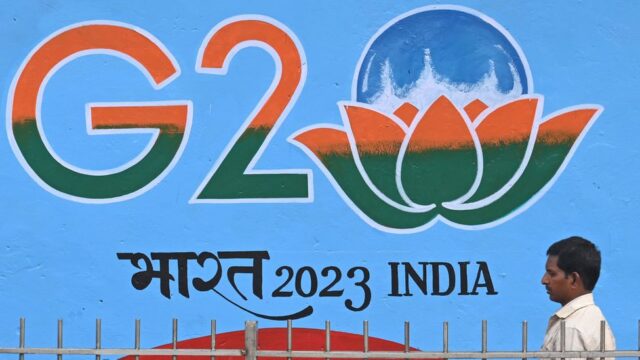The 18th G20 Summit of 2023, hosted by India, recently concluded in New Delhi, marking a significant diplomatic milestone for the nation. Themed “Vasudhaiva Kutumbakam” or “One Earth, One Family, One Future,”. The summit emphasized sustainable development and brought together leaders from the world’s largest economies to address pressing global challenges.
The G20, established in 1999 in response to the Asian financial crisis, has evolved into a platform for leaders of the world’s largest economies to address global economic and political challenges. It operates through three main tracks: the Finance Track, the Sherpa Track, and Engagement Groups, covering various aspects of global governance and cooperation. With India successfully concluding its G20 presidency, the baton has been passed to Brazil, continuing the troika system of rotating leadership among member nations. The G20 remains a critical forum for addressing pressing global issues and fostering international cooperation. On the sidelines of the summit, Prime Minister Modi engaged in bilateral meetings with world leaders, symbolically passing the G20 presidential gavel to Brazilian President Lula. Discussions covered a wide range of topics, including trade, infrastructure, and international relations. Leaders paid their respects to Mahatma Gandhi at his memorial, Raj Ghat, emphasizing the principles of peace and unity.
G20 New Delhi Declaration
The G20 New Delhi Leaders’ Declaration, with all 83 paragraphs unanimously approved, achieved a historic 100 percent consensus, even with China and Russia in agreement. Notably, the declaration contained no footnotes or Chair’s Summary, marking a significant moment in G20 history. Within these paragraphs, multiple agreements related to the Finance Track were embedded. Finance Minister Nirmala Sitharaman highlighted achievements, including a concrete strategy for strengthening multilateral development banks, regulating cryptocurrencies, and deploying digital public infrastructure for financial inclusion. She also emphasized the need for a faster debt relief plan for vulnerable nations. On climate change, the declaration stressed the urgency of mobilizing significant funding, with targets of “US$5.8-5.9 trillion in the pre-2030 period for developing countries” and “US$4 trillion per year for clean energy technologies by 2030” to achieve net-zero emissions by 2050. It called for a substantial increase in climate funding, transitioning from billions to trillions of dollars.
Global Leadership in Attendance
The G20 Summit witnessed the participation of prominent world leaders, including German Chancellor Olaf Scholz, French President Emmanuel Macron, British Prime Minister Rishi Sunak, Turkish President Recep Tayyip Erdoğan, Canadian Prime Minister Justin Trudeau, Italian Prime Minister Giorgia Meloni, South Korean President Yoon Suk Yeol, and Brazilian President Luiz Inácio Lula da Silva. Notably absent were Chinese President Xi Jinping and Russian President Vladimir Putin, represented instead by Premier Li Qiang and Foreign Minister Sergey Lavrov, respectively.
Consensus and Achievements
India’s leadership successfully achieved consensus around the New Delhi Declaration early in the summit, a noteworthy accomplishment given the differing positions of the U.S. and EU regarding Russia. The declaration also emphasized the United Nations Sustainable Development Goals, climate action, green development initiatives, multilateral financing, digital public infrastructure, artificial intelligence (AI), and international taxation.
Prime Minister Narendra Modi, who chaired the summit, viewed it as a diplomatic coup for India. He leveraged India’s economic significance to garner support from all G20 member nations for a Leaders’ Declaration recognizing the conflict in Ukraine without specifying any aggressor. Furthermore, Modi advocated for reforming global institutions like the United Nations Security Council (UNSC) to align with changing world dynamics, receiving backing from the United States. The timing of the G20 Summit was opportune, following India’s successful moon landing under the Chandrayaan-3 program, which added to India’s global prestige.
African Union Accepted as Part of the G20
In a significant development, the African Union, representing 55 African countries, was granted full membership in the G20, similar to the European Union. India’s active pursuit of support from the African continent aligns with its ambition for a permanent seat on the UNSC. India also extended invitations to Nigeria, Egypt, and Mauritius as part of the ‘Guest Countries’ at the G20 summit, further strengthening its ties with African nations.
India – Middle East – Europe Economic Corridor (IMEC)
During the summit, a Memorandum of Understanding (MoU) was signed among India, the U.S., Saudi Arabia, the European Union, the UAE, France, Germany, and Italy to establish the India – Middle East – Europe Economic Corridor (IMEC). This ambitious project aims to promote economic development by fostering integration between Asia, the Arabian Gulf, and Europe. IMEC falls under the Partnership for Global Infrastructure Investment (PGII), an initiative led by Western nations to support critical infrastructure projects worldwide.
Climate Action and Challenges
While leaders at the G20 Summit endorsed ambitious goals for climate action, including tripling global renewable energy capacity and reducing emissions, they did not reach a consensus on the phase-out of fossil fuels, casting a shadow over upcoming climate discussions set to commence in the UAE.
The G20 remains a vital platform for addressing these global challenges and working towards a more sustainable and prosperous future.









